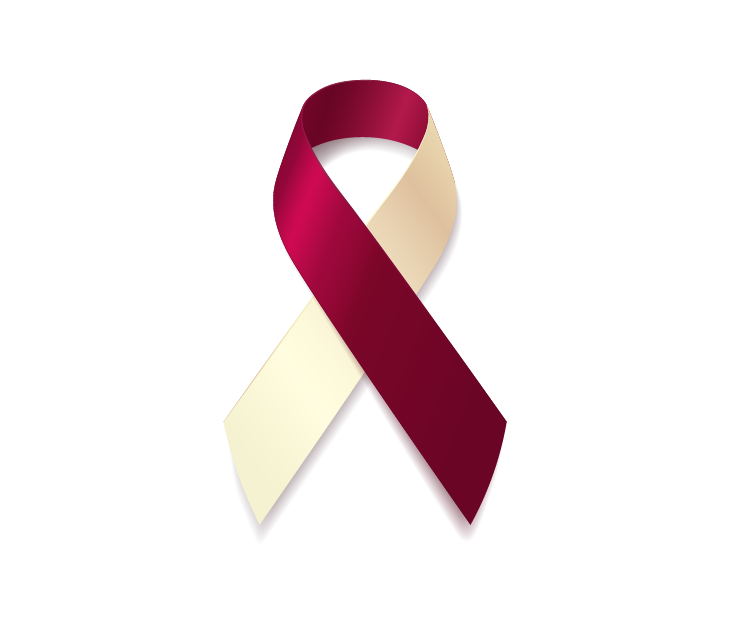Sign up for updates
Be the first to know when new information and articles become available.
Register now
Head and neck cancer may affect you or someone you care about. Read on to learn about risk factors, screening, and common types of treatment for this disease.
Early detection may mean better cancer outcomes.
From Harvard Health Publishing

Head and neck cancer includes cancers of the mouth, throat, voice box, nasal cavity, paranasal sinuses, and salivary glands. The burgundy and ivory ribbon is a symbol for head and neck cancer awareness. During the month of April, various organizations support increased awareness by sponsoring educational events, raising funds for research grants, distributing materials on disease detection and diagnosis, and providing resources for patients and caregivers. The month is highlighted by a weeklong series of events that includes a day of free cancer screenings throughout the US and abroad.
Visit Understand head and neck cancer for up-to-date information about this cancer, how it is staged, and more.
Two important risk factors for head and neck cancer are tobacco use and excess consumption of alcohol.
It is estimated that up to 80% of head and neck cancer is linked to tobacco use. Although both tobacco and alcohol use are separate risk factors for head and neck, when combined, the risk is increased even more. You can help reduce your risk by avoiding tobacco and alcohol products.
Other risk factors include certain viral infections, exposure to radiation, exposure to certain fibers, chemicals, and construction materials, as well as other causes.
There is no routine screening for head and neck cancer. But your doctor or dentist may check you for head and neck cancer with a thorough physical and visual exam of the entire mouth, head, and neck. This is because the cancer can arise in the mouth, throat, voice box, nasal cavity, paranasal sinuses, or salivary glands. Knowing what is normal for you and your health is the best way to detect when something changes.
Besides avoiding tobacco and alcohol, be aware of changes in your mouth, nose, throat, voice box, and head. Be aware of any new symptoms affecting your nasal breathing, swallowing or voice or any new changes to your mouth, nose or throat. Tell your health care provider if those symptoms or changes don’t go away within a week or two. Finding head and neck cancer early is important because patients with earlier stage cancer may have better results.
If your health care provider suspects that cancer may be a possibility, they may refer you to a specialist, such as an otolaryngologist (pronounced “oh-toe-lare-in-gall-oh-jist”), also known as an ENT doctor, who specializes in the treatment of the ears, nose, and throat.
After your head and neck cancer diagnosis is confirmed, treatments may include:
A treatment plan depends on a number of things, including the location of the tumor, the stage of the cancer, and the person’s age and general health. Talk to your doctor and stay active in the decision-making process to create the best path forward for you or your loved one. Learn more about cancer treatments by visiting Common cancer treatments.
Getting a cancer diagnosis may be a life-altering event. If someone you love has been diagnosed with head and neck cancer, they may not be ready to talk about it, or may not want to. You or your loved one may want to visit the National Cancer Institute’s Cancer Information Service where cancer support is available via phone, text chat, and email.
Sometimes the best way you can support someone with cancer is to offer help with some of the routine tasks that need to be done.
Be specific: Don’t ask someone “what can I do?” Instead offer a ride to doctors’ appointments, to drop off dinner, to clean the house, to take care of children or pets, or to house-sit while they are in the hospital.
Keep the needs of your loved ones affected by head and neck cancer in mind as you offer your support this April and beyond.

Be the first to know when new information and articles become available.
Register now